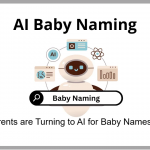Gone are the days of solely relying on dog-eared baby name books and lengthy family debates. In the age of artificial intelligence, a new consultant has entered the nursery: the AI baby name generator. From ChatGPT to specialized apps, parents are increasingly turning to algorithms for inspiration, validation, and the perfect, data-driven name for their child.
While these tools can be a fantastic source of ideas, they lack the nuance, heart, and foresight of human judgment. Relying on them without a critical eye can lead to some predictable, and often avoidable, naming regrets.
Why AI is a Tempting Baby Naming Tool for Parents?
The appeal is undeniable. AI name generators offer:
- Limitless Inspiration: Stuck between “classic” and “nature-inspired”? An AI can generate hundreds of options in seconds, breaking you out of a creative rut.
- Personalization: You can input incredibly specific prompts: “Give me a name that means ‘brave lion’ for a girl, is easy to pronounce in Spanish and English, and starts with the letter ‘L’.” The AI will deliver a tailored list.
- Trend Analysis: Some tools can analyze current popularity trends or predict the next “it” name, appealing to parents who want something either timeless or ahead of the curve.
- The Illusion of Objectivity: It feels scientific. An algorithm seems free from Aunt Susan’s strong opinions or your own sentimental biases.
- Desire for uniqueness: Many want names that aren’t super common. AI can explore niche or less obvious names. Also, because global exposure is high (movies, social media, internet), parents often want names that feel special or globally accessible.
- Cultural mixing / meaning: In increasingly multicultural families, or among diaspora communities, there’s interest in names that reflect mixed heritage, or that carry meaningful roots. AI helps surface names from different origins or assists with mashups or combinations.
The Pitfalls: Common Mistakes When Using AI for Naming
This is where the human element must intervene. Handing over the monumental task of naming your child to a machine comes with significant risks.
Mistake #1: Prioritizing Meaning Over Feeling
AI is excellent at sourcing name meanings from databases. The problem? It often presents these meanings as the name’s primary feature. You might fall in love with “Kendra” because the AI says it means “greatest champion,” without realizing that the sound, flow, and personal connection are far more important in daily life. A name is a feeling, not just a definition.
Mistake #2: Ignoring the “Playground Test”
An algorithm doesn’t understand childhood social dynamics. It might suggest a name that is beautifully unique but ripe for teasing. It can’t foresee the unfortunate initials (e.g., “Arthur Samuel Smith” becoming A.S.S.) or the rhymes and puns that clever schoolchildren will inevitably discover. This is a critical step that requires human intuition and empathy.
Mistake #3: Overlooking Practicality and Pronunciation
An AI might suggest the gorgeous Welsh name “Llewellyn” or the elegant Irish name “Saoirse” to parents in Kansas without any context for how often it will be misspelled and mispronounced. The algorithm doesn’t have to live with the lifelong burden of correcting teachers, baristas, and colleagues. It prioritizes the “idea” of the name over its real-world usability.
Mistake #4: Creating a Homogenized “AI Aesthetic”
As millions of parents use similar prompts (“unique but not too weird,” “strong and nature-inspired”), there’s a risk that AI will begin to funnel names into a new, algorithmically-generated trend. Instead of finding a truly unique name, you might end up with one that is part of a new wave of AI-recommended names that suddenly feel very common in your parenting group or local playground.
Mistake #5: The Illusion of Comprehensive Research
An AI can tell you a name’s origin and meaning, but it often lacks deeper cultural and historical context. It might not flag that a name is heavily tied to a specific religion you don’t practice, or that it’s the name of a notorious historical figure. It’s a starting point for research, not the finish line.
Mistake #6: Forgetting the Sound and Flow
While you can prompt an AI for names that “flow” with your surname, its judgment is mechanical. It can check syllables, but it can’t truly feel the rhythm. Does “Theodore Anderson” roll off the tongue, or does it create a stumbling, repetitive sound? Saying the full name out loud yelling it up the stairs, announcing it proudly is a irreplaceable human test.
How to Use AI as a Tool?
This doesn’t mean you should avoid AI name generators altogether. The key is to use them wisely.
- Use it for Brainstorming, Not Deciding: Let the AI be your creative assistant. Use its lists as a springboard for further discussion and research.
- Vet Every Suggestion Rigorously: Take any name you like and run it through the human tests: Say it out loud with your last name. Check the initials. Imagine it on a resume and a coffee cup. Tell it to a friend and see their genuine reaction.
- Dig Deeper Than the Database: Don’t stop at the meaning the AI provides. Research the name’s history, its popularity over time, and its cultural significance.
- Trust Your Gut: Ultimately, the name you choose should spark joy, pride, and a sense of connection. If a name from a list feels right to you, that’s more valuable than any algorithm’s ranking. Your intuition about what suits your future child is a powerful and irreplaceable tool.
Final Thoughts
The perfect baby name is a blend of sound, meaning, heritage, and personal significance. AI can be a brilliant partner in this journey, offering a treasure trove of possibilities you might never have considered. But the final, most important choice the one that will define your child for a lifetime should always be made by the human heart.








